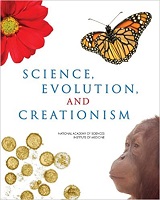
|
FreeComputerBooks.com
Links to Free Computer, Mathematics, Technical Books all over the World
|
|
- Title Science, Evolution, and Creationism
- Author(s) National Academy of Sciences (Author), Institute of Medicine (Author)
- Publisher: National Academies Press; (January 4, 2008)
- License(s): CC BY 4.0
- Paperback 88 pages
- eBook HTML and PDF
- Language: English
- ISBN-10: 0309105862
- ISBN-13: 978-0309105866
- Share This:

|
How did life evolve on Earth? The answer to this question can help us understand our past and prepare for our future. Although evolution provides credible and reliable answers, polls show that many people turn away from science, seeking other explanations with which they are more comfortable.
In this book, a group of experts assembled by the National Academy of Sciences and the Institute of Medicine explain the fundamental methods of science, document the overwhelming evidence in support of biological evolution, and evaluate the alternative perspectives offered by advocates of various kinds of creationism, including "intelligent design."
The book explores the many fascinating inquiries being pursued that put the science of evolution to work in preventing and treating human disease, developing new agricultural products, and fostering industrial innovations. The book also presents the scientific and legal reasons for not teaching creationist ideas in public school science classes.
About the Authors- Rahul Khanna is a platform architect at Intel Corporation involved in development of energy-efficient algorithms.
- General and Popular Science (Physics, Chemistry, Biology, etc.)
- Bioinformatics and Computational Biology
- Miscellaneous and Uncategorized Books
 Similar Books:
Similar Books:
-
 RNA, the Epicenter of Genetic Information (John Mattick, et al)
RNA, the Epicenter of Genetic Information (John Mattick, et al)
Documents the confused early history of DNA, RNA and proteins - a transformative history of molecular biology like no other. Integrates the influences of biochemistry and genetics on the landscape of molecular biology.
-
 DNA Replication and Human Disease (JMelvin L. DePamphilis )
DNA Replication and Human Disease (JMelvin L. DePamphilis )
With only two exceptions, the genome is replicated once and only once each time a cell divides. How is this feat accomplished? What happens when errors occur? This book addresses these questions by presenting a thorough analysis of the molecular events.
-
 Essentials of Genetics (Heidi Chial, et al.)
Essentials of Genetics (Heidi Chial, et al.)
This book is a brief guide through the core concepts of how genes are structured and how they drive biological diversity, can be used as a guide for introductory biology students, a reference, or a self-guided exploration for general science enthusiasts.
-
 Routledge Handbook of Chinese Medicine (Vivienne Lo, et al.)
Routledge Handbook of Chinese Medicine (Vivienne Lo, et al.)
This book is an extensive, interdisciplinary guide to the nature of traditional medicine and healing in the Chinese cultural region, and its plural epistemologies. It will be of interest to practitioners, patients and specialists, etc.
-
 The Limits Of Science (Nicholas Rescher)
The Limits Of Science (Nicholas Rescher)
This book explores in detail the existence of limits or limitations on scientific inquiry, especially those that, in principle, preclude the full realization of the aims of science, as opposed to those that relate to economic obstacles to scientific progress.
-
 Quantum Computing for the Quantum Curious
Quantum Computing for the Quantum Curious
This open access book makes quantum computing more accessible than ever before. It bridges the gap between popular science articles and advanced textbooks by making key ideas accessible with just high school physics as a prerequisite.
-
 Marie Curie and the Science of Radioactivity (Naomi Pasachoff)
Marie Curie and the Science of Radioactivity (Naomi Pasachoff)
Marie Curie discovered radium and went on to lead the scientific community in studying the theory behind and the uses of radioactivity. She left a vast legacy to future scientists through her research, her teaching, and her contributions to the welfare of humankind.
-
 Ramblings of a Mad Scientist: 100 Ideas for a Stranger Tomorrow
Ramblings of a Mad Scientist: 100 Ideas for a Stranger Tomorrow
This collection invigorates and inspires with one hundred original concepts, ideas, and inventions spanning many topics, including transportation, mobile devices, wearable electronics, games, emerging technologies, and more.
-
 On The Origin of the Human Mind (Andrey Vyshedskiy)
On The Origin of the Human Mind (Andrey Vyshedskiy)
Using his background in neuroscience, the author offers an elegant, parsimonious theory of the evolution of the human mind and suggests experiments that could be done to test, refute, or validate the hypothesis.





